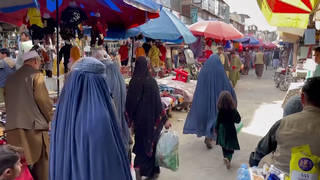
A massive 5.9-magnitude earthquake that struck southeastern Afghanistan early Wednesday has killed more than 1,000 people, according to local officials, though the death toll is expected to rise. The earthquake comes as the United Nations reports nearly half of Afghanistan’s population already faces acute hunger. Thousands more have been injured and lost their homes along with everything they own. “Many more will be dead, and we are now rushing with aid,” says Jan Egeland, secretary general of the Norwegian Refugee Council. He says he agrees with the Taliban government that U.S. sanctions on Afghanistan are making it more difficult for aid organizations like his to supply critical resources to Afghans.
Transcript
AMY GOODMAN: Officials in southeastern Afghanistan say a massive earthquake early Wednesday has killed more than 1,000 people. Afghans described the moment the 5.9-magnitude earthquake struck their homes in Paktika province.
FATIMA: [translated] It was midnight when the quake struck. The kids and I screamed. One of our rooms was destroyed. Our neighbors screamed, and we saw everyone’s rooms.
FAISAL: [translated] It was about midnight when the quake struck. It destroyed the houses of our neighbors. When we arrived, there were many dead and wounded. They sent us to the hospital. I also saw many dead bodies.
AMY GOODMAN: The death toll from the earthquake is expected to rise. Thousands have been injured, lost their homes and everything they owned.
The earthquake comes as the United Nations reports nearly half of Afghanistan’s population already faces acute hunger. The Taliban has called for more international aid, while saying sanctions have hampered the government’s ability to respond to the multiple crises facing the country. Some aid groups, like the Norwegian Refugee Council, report their teams are now on the ground in Afghanistan to support affected communities with funds and emergency shelter.
For more, we’re joined by Jan Egeland, secretary general of the Norwegian Refugee Council. Now, he’s in Somalia, which we’re going to talk about in a minute.
But first, Jan, if you can talk about the situation in Afghanistan after this devastating earthquake and what kind of humanitarian work is underway, what needs to get to the affected area?
JAN EGELAND: The situation in eastern Afghanistan, in Khost and in Paktia, is truly desperate. It’s like all of the plagues of the Bible falling down on these very poor people at the same time.
So, we are — have been operational in Afghanistan for decades. We have 1,400 aid workers on the ground. We did not leave when the Taliban took over, nor did we leave these areas. So, from Khost, the city, we sent teams immediately.
And I just got some images of the devastation from our field workers on the ground. It is — these are very poor houses. They have weak structures, in very poor, mountainous communities. The number of people killed will go up. The 1,000 you just mentioned is too low. Many more will be dead.
And we are now rushing with aid. We will build shelter for the people who lost everything. And we’ll also try to have cash distributions to those who cannot afford anything at the moment.
AMY GOODMAN: And your comment on the Taliban saying that sanctions are hurting aid efforts?
JAN EGELAND: No, of course. Of course. I mean, if you’re in a country where we, the aid organizations, cannot even do normal bank transfers — the banking system is paralyzed. The regime that took over is under heavy sanctions. It is much more difficult, much more costly to do aid work, but it’s not stopping us. We’re continuing to work.
We understand that people are as angry as we are that the Taliban are preventing girls from getting secondary education. But it will be the ultimate insult to these girls that they starve to death and perish in earthquakes because of our opposition to the education policies of Taliban.
So, of course, we have to help. And the sanctions must give a much more clear blanket exemption to humanitarian work. We need to be able to do financial transactions normally to our aid workers on the ground.













Media Options